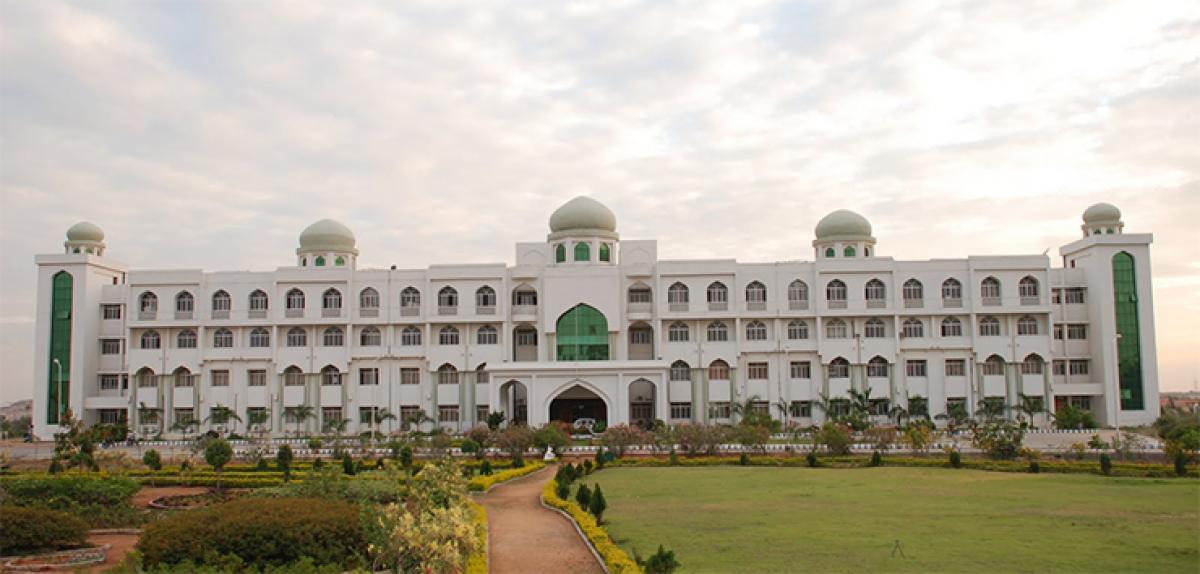Live
- Iraq rejects use of airspace for strikes on Iran, warns of conflict expansion
- Women's T20 WC: Renuka, Deepti restrict Australia to 151/8 in crucial encounter
- RG Kar case: Bengal Chief Secy calls meeting with doctors’ associations on Monday
- Patang Sets for Theatrical Release on December 27
- Anil Vij meets JP Nadda as BJP prepares for govt formation in Haryana
- Devotees visiting Puri Jagannath Temple will soon get free 'Mahaprasad'
- Mrs. India 2024 Hemalatha Reddy Graces Dandiya Events at Bathukamma Festival in Hyderabad
- Baba Siddique murder: One gets police custody till Oct 21, another sent for medical test; 2 absconding
- Head Constable Commits Suicide by Shooting Himself at Mahabubabad Collectorate
- Car Catches Fire in Shamshabad, Passengers Escape Unharmed
Just In

The H.K. Sherwani Centre for Deccan Studies at the Maulana Azad National Urdu University, established in 2012, is launching a new initiative - Deccan Heritage Club - to tap the spirit of celebrating the past glory of the Deccan region from the present academic year 2015.
The membership of this Club, which began on Monday, would end by August 7 and is open to the university’s Post Graduate students
Hyderabad: The H.K. Sherwani Centre for Deccan Studies at the Maulana Azad National Urdu University, established in 2012, is launching a new initiative - Deccan Heritage Club - to tap the spirit of celebrating the past glory of the Deccan region from the present academic year 2015.
The membership of this Club, which began on Monday and would end by August 7, is open to the university’s Post Graduate students (First and Second Years) of the School of Arts and Social Sciences (viz. Departments of History, Public Administration, Political Science, Economics, Sociology, Social Work, Islamic Studies, and Women Studies). A meeting to discuss the Club activities is scheduled to be held on the last Thursday of every month between 3-5 pm.

Main activities
The Deccan Heritage Club will cater to students of MANUU who come from varied regions and backgrounds to explore their creativity and understand and appreciate the rich local heritage of the Deccan. From the platform of Deccan Heritage Club a number of activities will be held on a monthly basis such as:
- field trips to monuments and archaeological sites
- heritage walks in historical areas
- site visits to museums, craft centres, textile loom units, handicraft workshops
- quiz/discussion forums/talks/ powerpoint presentations by experts
- bulletin board displays on heritage/documenting local living heritage
- adopting a local monument, finding out its local official and oral history
- sketching competitions for students at built heritage sites
- workshops with experts which involve hands on learning like folk arts, iron smithy The noteworthy focus on heritage is seen in the statement of the Finance Minister in his Budget speech of 2015 when a specific mention was made of India having 25 Cultural World Heritage Sites. It was proposed to provide resources to improve the deficient facilities for important heritage sites among which Hampi, Karnataka, Elephanta Caves, Mumbai, Qutb Shahi Tombs, Hyderabad, Telangana from the Deccan feature prominently.
Background
The concept of heritage education in all its forms has received a lot of attention across India and both primary and secondary education has used it in developing many fascinating outcomes. This is because heritage lends itself very well to new pedagogical approaches, such as cross-curricular collaboration and project work.
While some State governments like Nagaland have made heritage study compulsory, the NDA government’s review of the National Commission for Heritage Sites Bill by the Ministry of Culture aims at the creation of a National Commission for Preservation of Heritage Sites.
The importance being doled out to heritage study in India in recent times is also seen in the fact that the UGC conducted an interface meeting in April and May 2015 under the scheme of granting Special Heritage Status to Colleges. Around 19 colleges all over India were identified to receive special grants for conservation and preservation of heritage buildings, rare books, maintaining heritage and art galleries etc. The financial assistance granted to these 19 colleges is almost to the tune of 25 crore.

© 2024 Hyderabad Media House Limited/The Hans India. All rights reserved. Powered by hocalwire.com







